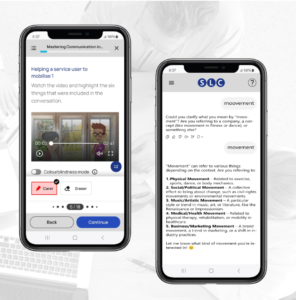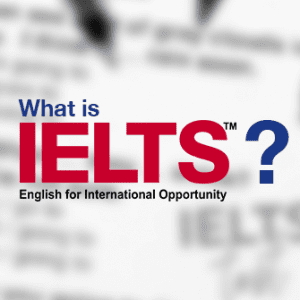
SLC win Ufi grant to develop AI language learning app for social carers
We’re delighted to have won a grant from Ufi VocTech Trust to develop an AI-driven technology solution that provides cheap phone-based language and communication skills

IELTS stands for the International English Language Testing System.
The IELTS exam is now taken by over 2.5 million people every year. It is recognised by universities, companies, professional bodies such as the GMC and NMC, immigration authorities, and government institutions all around the world as a measure of English Language ability.
There are two different types of IELTS exam:
For both modules, there are 4 parts: reading, writing, listening and speaking. The reading and writing sections are different for the 2 modules, whereas the listening and speaking sections are the same.
1. IELTS Academic module: there are 3 long texts on a variety of academic subjects. They are authentic and taken from newspapers, journals, and so on. They may be factual, analytical or opinion-based.
2. IELTS General Training module: there are a series of shorter, more factual texts — related to living and working in an English speaking country — and one longer, more complex text of general interest. They are also authentic texts and taken from notices, documents, magazines, etc.
In both modules, candidates have to identify key points, important information, understand meaning, recognise the writer’s opinion, and summarise arguments effectively.
1. IELTS Academic module: candidates must write 2 texts. The first piece of writing is a report on some data, such as statistical tables or graphs. The second piece is an essay, in which candidates must respond to an opinion or statement about a particular topic.
2. IELTS General Training module: test-takers must also write 2 texts. The first is a letter written in response to a specific situation. The second is an essay responding to an opinion of statement. The writing here can be more informal than in the Academic module.
Candidates are marked on a range of criteria. These include whether they have answered the question set, used an appropriate style of language, and organised their thoughts clearly. They will also be marked on grammatical accuracy, range of vocabulary, and their ability to connect ideas, sentences, and paragraphs correctly.
There are 4 texts, 2 of them set in a social context, and 2 in a more educational or academic context. The texts may be conversations, discussions or a monologue. There will be a variety of accents used by the different speakers.
Test-takers will need to listen for specific information, understand the main gist, and understand speakers’ opinions and attitudes. There will be a variety of different types of question to answer.
This is a face-to-face speaking test with an IELTS examiner. There are 3 parts to the test. The first is an introductory conversation; in the second, the candidate is given 1 minute to prepare a short presentation on a topic; in the third, the examiner and the candidate will discuss some questions connected with the topic in part 2.
Candidates are marked on their ability to express themselves clearly and accurately, to answer questions appropriately, their range of grammar and vocabulary, their level of ‘naturalness’, and their pronunciation and intonation.
The IELTS Speaking Test may take place on a different day to the other parts of the exam.
There is no pass or fail for the IELTS exam. Instead, you receive a band score between 1 and 9. This may include a half point, such as 6.5 for example.
Most universities typically require a score of between 6 and 7. Some may also demand a minimum score in each of the 4 papers.
IELTS test centres set the fees, and therefore these may vary from country to country. However, candidates should expect to pay around £150 GBP, 190 Euros or $200 USD.
If you did not achieve the score you required, then you can re-take a test as soon as you feel ready to do so. You can take as many tests as you like.
IELTS was created by and is jointly owned by the British Council, the University of Cambridge ESOL Examinations, and IDP: IELTS Australia.
We are IELTS preparation specialists. Our uniquely effective course design and delivery offers an unparalleled range of Medical- and exam-focused courses and tests.
Our courses will enable you to achieve a high score in the IELTS Academic English test.
Specialist Language Courses (SLC) are experts in both IELTS and OET preparation. We work with thousands of candidates every year and specialise in working with healthcare professionals. Clients include many NHS Trusts and private healthcare groups in the UK.
Call or email SLC to talk about your OET and IELTS options.
Get updates and get the latest materials on Medical English, OET and IELTS

We’re delighted to have won a grant from Ufi VocTech Trust to develop an AI-driven technology solution that provides cheap phone-based language and communication skills

We’re delighted to announce a partnership with leading Medical English app, Doxa.
